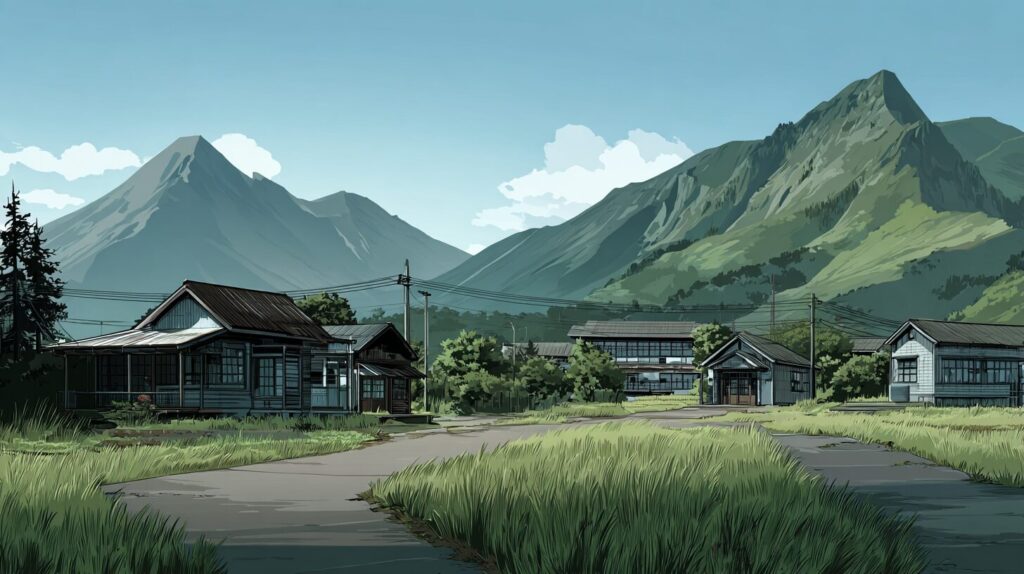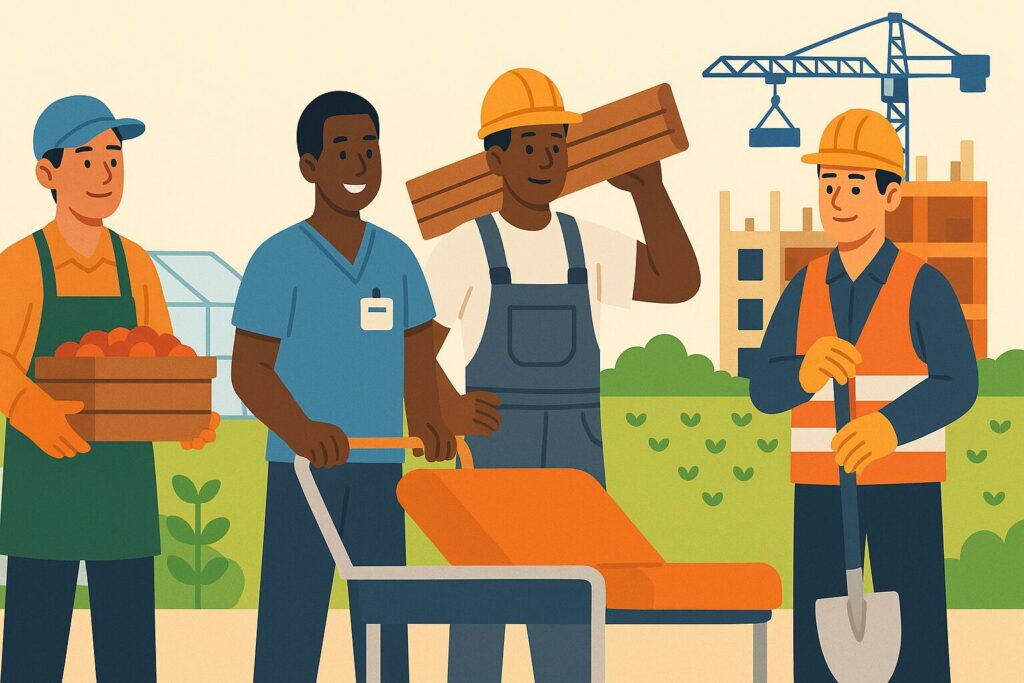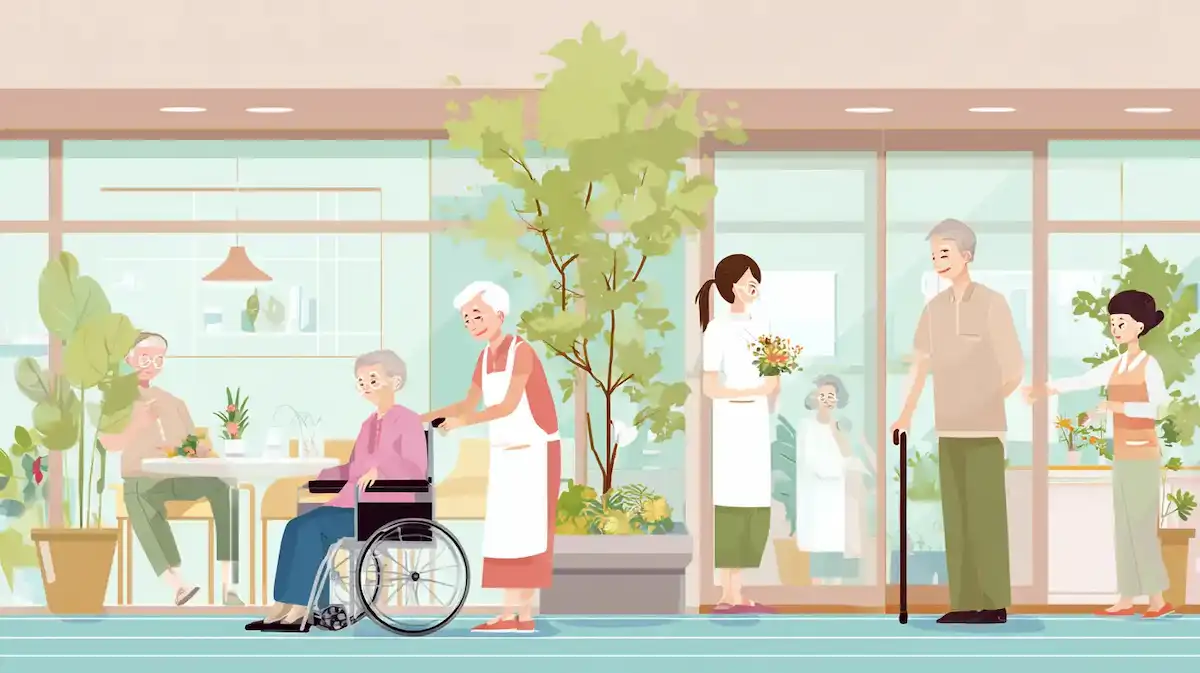日本の少子高齢化を英語で説明・紹介するための基本情報と、英会話に役立つ表現をシンプルでわかりやすい英語で紹介します。
英会話ダイアローグ・概要・10の質問を通して、少子高齢化に関する英語表現を学びます。
英語
英会話ダイアローグを読む前に知っておくと良い前提知識と情報です。
- 日本の人口問題
- 出生率が非常に低く(2024年で1.15)、子どもの数が年々減っている
- 一方で高齢者(65歳以上)の割合が増えており、2024年時点で約29%
- 日本全体の人口が減少し、社会や経済にさまざまな影響が出ている
- 少子高齢化の主な要因と影響
- 晩婚化や未婚化、子育て費用の高さ、働き方の問題などが出生率低下の大きな要因
- 若者が減り、高齢者が増えることで、労働力不足や社会保障の負担増、地域の過疎化など多くの課題が生まれている
- 社会の対応策と新しい動き
- 政府は子育て支援の拡充、働き方改革、高齢者の就労支援など多様な対策を行っている
- 労働力不足を補うため、外国人労働者の受け入れ拡大も進んでいる
- これらの動きや制度の変化は、今後の日本社会に大きな影響を与えている
- 日本政府の主な取り組み
- 子育て支援: 出産・育児への経済的支援(出産一時金、児童手当など)、保育施設の拡充、育児休業の取得推進、働き方改革(長時間労働の是正、多様な働き方の推進)など
- 高齢者支援と就労促進: 健康寿命の延伸、高齢者の社会参加の促進、高齢者の再雇用や再就職支援、介護サービスの充実など
- 外国人材の活用: 労働力不足を補うため、特定の技能を持つ外国人材受け入れのための在留資格(「特定技能」など)の創設など
2人が日本の人口減少と高齢化社会について話しています。
出生率の低下や高齢化の現状、その原因や社会への影響、政府の対策、外国人労働者の受け入れなどを話題にしています。
会話 / dialogue

Hey Key, have you ever thought about Japan’s population issues? I’ve been reading a lot about declining birthrates and the aging society lately.

Yeah, it’s a pretty big topic these days. Japan’s population is shrinking and getting older at the same time. What made you interested in it?

Actually, my cousin works in a local government office, and she told me how hard it is to keep community services running in rural areas. It made me want to understand the bigger picture.

That makes sense. Did you know the birthrate in Japan is now just about 1.15 children per woman? It’s way below the replacement level.

Really? No wonder the population is decreasing. Why are people having fewer kids?

There are several reasons—late marriage, high costs of raising kids, long working hours, and a lack of childcare support. Many young people also feel it’s difficult to balance work and family life.

I heard a lot of my friends say they’re worried about money and job security before thinking about starting a family.

Exactly. Plus, society is changing, and more people choose to stay single or focus on their careers.

What about the aging population? I see so many elderly people in Tokyo these days.

That’s another major issue. Around 29% of Japan’s population is now aged 65 or older. We have one of the highest percentages of elderly people in the world.

How does this affect daily life and the economy?

Well, with fewer young people, there’s a shortage of workers. It puts a lot of pressure on the economy and makes it difficult to support social welfare systems, like pensions and healthcare.

So, are there any solutions being tried by the government?

Yes, actually. The government is trying to support families with financial aid, expand childcare, and encourage more flexible working styles—like shorter hours or even a four-day workweek in some places.

That sounds helpful. Are there any efforts to support the elderly?

Definitely. There are more opportunities for seniors to keep working, and investments are being made in elderly care and medical services.

But is it enough? I hear some small towns are losing so many young people that schools and stores have to close.

You’re right. Rural depopulation is a serious problem. Some towns offer financial incentives for families or people who move there, but it’s still hard to stop the decline.

I also heard about accepting more foreign workers. How is that going?

That’s another strategy. Japan now has new visa programs for foreign workers, especially in sectors like construction, farming, and nursing care. In 2024, there were about 2.3 million foreign workers in Japan.

Are foreign workers allowed to bring their families and change jobs easily?

Under the new system, it’s becoming easier. Some visas let workers stay longer or bring family members if they pass certain tests. Also, companies must provide Japanese language lessons.

That’s good to know. But are there any problems for foreign workers?

Unfortunately, yes. Some still face low wages or unfair treatment. The government is working to improve the situation, but there are challenges.

It sounds like Japan is doing a lot, but there’s still a long way to go.

Exactly. It’s a complex issue. The government is trying many solutions, but changing society takes time.

Thanks, Key. This really helped me understand why everyone’s talking about Japan’s population decline and aging society, and why it matters for the country’s future.

No problem! If you’re interested, we could visit a local community center sometime and see some of the support programs in action.
概要 / Overview
「日本の少子高齢化」について、理解を深めるための「英語での概要」です。
日本の少子高齢化

Introduction
Japan is facing two big problems: a falling birthrate and a rapidly aging population. These issues are changing Japanese society and creating new challenges for the future.
Fewer Children Are Being Born
Every year, fewer babies are born in Japan. In 2024, the birthrate was only 1.15 children per woman, much lower than the number needed to keep the population steady. Many young people are getting married later or not at all. The high cost of raising children, job worries, and lack of childcare support make it harder for families to have more children.
More Elderly People
At the same time, the number of elderly people is growing fast. Today, about 29% of Japanese people are aged 65 or older. People in Japan live long lives because of good healthcare and healthy lifestyles. However, this means there are fewer young people to work and care for the growing number of seniors.
Effects on Society and the Economy
With fewer workers, Japan faces problems like a shrinking workforce and more pressure on pensions and healthcare. Many rural areas are losing people, and some schools or shops have to close. The government is trying to help by offering more support for families and accepting more foreign workers, but solving these problems will take time.
Conclusion
Japan’s declining birthrate and aging population are serious challenges. They affect the economy, daily life, and the country’s future. Finding solutions will be very important for Japanese society.
10の質問 / 10 questions
「日本の少子高齢化」について、理解を深めるための「英語での10の質問」です。
1: What does “declining birthrate” mean in Japan?
It means fewer babies are born each year in Japan. The number of children is getting smaller.
2: What is “aging population”?
An aging population means there are more and more elderly people in a country, especially people over 65 years old.
3: Why are fewer babies being born in Japan?
Many young people get married later or do not marry. Raising children is expensive and work-life balance is difficult.
4: How many elderly people are there in Japan?
About 29 percent of people in Japan are now 65 years old or older.
5: What problems does the aging society cause?
There are fewer workers, and it is hard to pay for pensions, healthcare, and elderly care.
6: How does population decline affect the countryside?
In rural areas, there are fewer young people. Some schools and shops have to close, and towns may lose services.
7: What is the government doing to help families?
The government gives money to families, builds more childcare centers, and supports flexible working styles.
8: Why is Japan accepting more foreign workers?
There are not enough workers, so foreign workers help fill jobs in places like hospitals, farms, and factories.
9: Can foreign workers bring their families to Japan?
In some cases, yes. Some visas allow foreign workers to bring their families if they meet certain conditions.
10: Why is solving the declining birthrate and aging population important for Japan’s future?
Because these problems affect the economy, society, and daily life. Finding solutions is necessary for a better future.

和訳付
会話 / dialogue

Hey Key, have you ever thought about Japan’s population issues? I’ve been reading a lot about declining birthrates and the aging society lately.
ねえキー、日本の人口問題について考えたことある?最近、少子化とか高齢化社会について色々読んでてさ。

Yeah, it’s a pretty big topic these days. Japan’s population is shrinking and getting older at the same time. What made you interested in it?
うん、今すごく話題になってるよね。日本の人口って減りながら、どんどん高齢化も進んでるし。何がきっかけで興味持ったの?

Actually, my cousin works in a local government office, and she told me how hard it is to keep community services running in rural areas. It made me want to understand the bigger picture.
実は、いとこが地方自治体で働いてて、田舎だと地域サービスを維持するのが本当に大変だって話を聞いたんだ。それで全体の流れを知りたくなってさ。

That makes sense. Did you know the birthrate in Japan is now just about 1.15 children per woman? It’s way below the replacement level.
なるほどね。ちなみに今、日本の出生率って1.15くらいなんだよ。人口を維持するための数より、ずっと低いんだ。

Really? No wonder the population is decreasing. Why are people having fewer kids?
そうなんだ?そりゃ人口も減るよね。どうしてみんな子どもが少なくなってるの?

There are several reasons—late marriage, high costs of raising kids, long working hours, and a lack of childcare support. Many young people also feel it’s difficult to balance work and family life.
いろいろ理由があって…結婚が遅かったり、子育てにお金がかかったり、長時間労働とか、保育のサポートが足りなかったり。若い人は仕事と家庭の両立が難しいと感じてるみたいだよ。

I heard a lot of my friends say they’re worried about money and job security before thinking about starting a family.
僕の友だちもみんな、家族を持つ前にまずお金や仕事の安定が心配だって言ってる。

Exactly. Plus, society is changing, and more people choose to stay single or focus on their careers.
そうなんだよね。それに社会も変わってきて、独身でいる人やキャリアを優先する人も増えてるし。

What about the aging population? I see so many elderly people in Tokyo these days.
高齢化はどう?最近、東京でもお年寄りがすごく増えた気がするんだよね。

That’s another major issue. Around 29% of Japan’s population is now aged 65 or older. We have one of the highest percentages of elderly people in the world.
それも大きな問題だよね。今や日本の人口の約29%が65歳以上なんだ。世界でもトップクラスの高齢化率だよ。

How does this affect daily life and the economy?
これって、日常生活や経済にどんな影響があるの?

Well, with fewer young people, there’s a shortage of workers. It puts a lot of pressure on the economy and makes it difficult to support social welfare systems, like pensions and healthcare.
若い人が減るから、働き手が足りなくなってるし、経済への負担も大きくなる。年金や医療みたいな社会保障も支えるのが大変になってるよ。

So, are there any solutions being tried by the government?
じゃあ、政府は何か対策してるの?

Yes, actually. The government is trying to support families with financial aid, expand childcare, and encourage more flexible working styles—like shorter hours or even a four-day workweek in some places.
うん、いろいろやってるよ。子育て家庭へのお金の支援とか、保育の充実、あとは働き方改革で時短勤務や週休4日制度を導入してる自治体もあるんだ。

That sounds helpful. Are there any efforts to support the elderly?
それは助かるね。高齢者向けの取り組みもあるの?

Definitely. There are more opportunities for seniors to keep working, and investments are being made in elderly care and medical services.
もちろん。高齢者が働き続けられるチャンスも増えてるし、介護や医療サービスへの投資も進んでるよ。

But is it enough? I hear some small towns are losing so many young people that schools and stores have to close.
でも、それだけで十分なのかな?地方では若い人がいなくなって、学校やお店がなくなるって聞いたことあるよ。

You’re right. Rural depopulation is a serious problem. Some towns offer financial incentives for families or people who move there, but it’s still hard to stop the decline.
その通り。地方の人口減少は本当に深刻なんだ。移住した人や子育て世帯にお金を出してる町もあるけど、なかなか歯止めがきかないんだよね。

I also heard about accepting more foreign workers. How is that going?
外国人労働者の受け入れも進んでるって聞いたけど、どうなんだろう?

That’s another strategy. Japan now has new visa programs for foreign workers, especially in sectors like construction, farming, and nursing care. In 2024, there were about 2.3 million foreign workers in Japan.
それも対策の一つだよ。今は建設や農業、介護とかで働く外国人向けの新しいビザ制度ができてる。2024年には約230万人の外国人労働者が日本にいたんだ。

Are foreign workers allowed to bring their families and change jobs easily?
外国人の人たちは、家族を呼んだり転職したりって簡単にできるの?

Under the new system, it’s becoming easier. Some visas let workers stay longer or bring family members if they pass certain tests. Also, companies must provide Japanese language lessons.
新しい制度だと、前より簡単になってきてるよ。試験に合格すれば長くいられたり、家族を呼べるビザもあるし、会社が日本語の授業も用意しないといけないんだ。

That’s good to know. But are there any problems for foreign workers?
それは安心だね。でも、外国人労働者の人たちにも何か問題があるのかな?

Unfortunately, yes. Some still face low wages or unfair treatment. The government is working to improve the situation, but there are challenges.
残念ながら、まだ課題はあるよ。給料が低かったり、不公平な扱いを受けている人もいるし、国も改善しようとしてるけど、なかなか難しい部分もあるんだ。

It sounds like Japan is doing a lot, but there’s still a long way to go.
色々やってるけど、まだ道のりは長そうだね。

Exactly. It’s a complex issue. The government is trying many solutions, but changing society takes time.
そうなんだ。本当に複雑な問題だから、いろんな対策をしてても、社会が変わるにはやっぱり時間がかかるよね。

Thanks, Key. This really helped me understand why everyone’s talking about Japan’s population decline and aging society, and why it matters for the country’s future.
ありがとう、キー。これでなんでみんなが人口減少と高齢化について話してるのか、そしてそれが日本の未来にとって大事なのか、よく分かったよ。

No problem! If you’re interested, we could visit a local community center sometime and see some of the support programs in action.
どういたしまして!もし興味があったら、今度一緒に地域のコミュニティセンターに行って、実際の支援プログラムを見てみるのもいいかもね。
概要 / Overview
日本の少子高齢化

Introduction
Japan is facing two big problems: a falling birthrate and a rapidly aging population. These issues are changing Japanese society and creating new challenges for the future.
日本は、出生率の低下と急速な高齢化という2つの大きな問題に直面しています。これらの問題は日本社会を変化させ、将来への新たな課題を生み出しています。
Fewer Children Are Being Born
Every year, fewer babies are born in Japan. In 2024, the birthrate was only 1.15 children per woman, much lower than the number needed to keep the population steady. Many young people are getting married later or not at all. The high cost of raising children, job worries, and lack of childcare support make it harder for families to have more children.
日本では毎年、生まれる赤ちゃんの数が減っています。2024年の出生率は女性1人あたり1.15人で、人口を維持するために必要な数よりもはるかに低いです。若い人たちは結婚を遅らせたり、結婚しない人も増えています。子育ての費用の高さや仕事への不安、保育のサポート不足が、家族がたくさん子どもを持つことを難しくしています。
More Elderly People
At the same time, the number of elderly people is growing fast. Today, about 29% of Japanese people are aged 65 or older. People in Japan live long lives because of good healthcare and healthy lifestyles. However, this means there are fewer young people to work and care for the growing number of seniors.
同時に、高齢者の数も急速に増えています。現在、日本人の約29%が65歳以上です。日本では医療や生活習慣が良いため長生きする人が多いですが、その分、働く若い人や高齢者を支える人が減っています。
Effects on Society and the Economy
With fewer workers, Japan faces problems like a shrinking workforce and more pressure on pensions and healthcare. Many rural areas are losing people, and some schools or shops have to close. The government is trying to help by offering more support for families and accepting more foreign workers, but solving these problems will take time.
働く人が減ることで、労働力不足や年金・医療の負担増などの問題が起きています。地方では人口が減り、学校やお店が閉鎖されることもあります。政府は家族への支援や外国人労働者の受け入れなどの対策を進めていますが、解決には時間がかかりそうです。
Conclusion
Japan’s declining birthrate and aging population are serious challenges. They affect the economy, daily life, and the country’s future. Finding solutions will be very important for Japanese society.
日本の少子高齢化は深刻な課題です。経済や日常生活、国の将来にも大きな影響があります。これからの日本社会にとって、解決策を見つけることがとても大切です。
10の質問 / 10 questions
1: What does “declining birthrate” mean in Japan?
日本で「出生率の低下」とは何を意味しますか?
It means fewer babies are born each year in Japan. The number of children is getting smaller.
日本では毎年生まれる赤ちゃんが減っていることを意味します。子どもの数が少なくなっています。
2: What is “aging population”?
「高齢化」とは何ですか?
An aging population means there are more and more elderly people in a country, especially people over 65 years old.
高齢化とは、国の中で高齢者、特に65歳以上の人がどんどん増えていくことです。
3: Why are fewer babies being born in Japan?
なぜ日本では赤ちゃんが少なくなっているのですか?
Many young people get married later or do not marry. Raising children is expensive and work-life balance is difficult.
多くの若い人が結婚を遅らせたり結婚しなかったりします。子育てにはお金がかかり、仕事と家庭の両立も難しいです。
4: How many elderly people are there in Japan?
日本にはどのくらい高齢者がいますか?
About 29 percent of people in Japan are now 65 years old or older.
現在、日本の人口の約29%が65歳以上です。
5: What problems does the aging society cause?
高齢化社会はどんな問題を引き起こしますか?
There are fewer workers, and it is hard to pay for pensions, healthcare, and elderly care.
働く人が減り、年金や医療、介護の負担が重くなります。
6: How does population decline affect the countryside?
人口減少は田舎にどんな影響を与えますか?
In rural areas, there are fewer young people. Some schools and shops have to close, and towns may lose services.
田舎では若い人が減っています。学校やお店が閉まったり、地域のサービスがなくなることもあります。
7: What is the government doing to help families?
家族を助けるために政府は何をしていますか?
The government gives money to families, builds more childcare centers, and supports flexible working styles.
政府は家族にお金を支給したり、保育所を増やしたり、柔軟な働き方をサポートしたりしています。
8: Why is Japan accepting more foreign workers?
なぜ日本はもっと多くの外国人労働者を受け入れているのですか?
There are not enough workers, so foreign workers help fill jobs in places like hospitals, farms, and factories.
働き手が足りないため、外国人労働者が病院や農場、工場などの仕事を助けてくれています。
9: Can foreign workers bring their families to Japan?
外国人労働者は家族を日本に呼ぶことができますか?
In some cases, yes. Some visas allow foreign workers to bring their families if they meet certain conditions.
場合によっては可能です。条件を満たせば家族を呼べるビザもあります。
10: Why is solving the declining birthrate and aging population important for Japan’s future?
なぜ少子高齢化を解決することが日本の未来にとって重要なのですか?
Because these problems affect the economy, society, and daily life. Finding solutions is necessary for a better future.
これらの問題は経済や社会、日常生活に影響を与えるからです。より良い未来のためには解決策を見つけることが必要です。

words & phrases
英会話ダイアローグと関連情報に出てきた単語・フレーズです(例文は各3つ)。

depopulation : 名詞 /ˌdiːˌpɒpjʊˈleɪʃən/
意味: 人口減少。The reduction in the number of people living in a place.
(日本の田舎で若者が減り、町が過疎化する現象を指す)
例文:
- Rural depopulation is a big problem in Japan.
「日本では田舎の人口減少が大きな問題です。」 - The government is trying to stop depopulation in small towns.
「政府は小さな町の人口減少を止めようとしています。」 - Depopulation leads to the closing of schools and shops.
「人口減少は学校やお店の閉鎖につながります。」
shrinking : 形容詞・動名詞 /ˈʃrɪŋ.kɪŋ/
意味: 縮小する、減少している。Getting smaller in size, amount, or number.
(人口や労働力が年々減っている状況を表す)
例文:
- Japan has a shrinking workforce.
「日本は労働人口が減少しています。」 - The number of students in rural schools is shrinking every year.
「地方の学校の生徒数は毎年減少しています。」 - The company is worried about its shrinking profits.
「会社は利益の減少を心配しています。」
balance : 名詞・動詞 /ˈbæl.əns/
意味: バランス、釣り合い。A state where different things are equal or in the correct proportions.
(仕事と家庭のバランス(両立)が難しい、という話題)
例文:
- It is hard to find a balance between work and family life.
「仕事と家庭生活のバランスを取るのは難しいです。」 - Good health depends on a balance of diet and exercise.
「健康は食事と運動のバランスにかかっています。」 - She tried to balance her job and her studies.
「彼女は仕事と勉強の両立をしようと努力しました。」
helpful : 形容詞 /ˈhelp.fəl/
意味: 役に立つ、助けになる。Giving help; making things easier or better.
(政府の支援策やサービスが人々の助けになることを表現)
例文:
- The new childcare service is very helpful for parents.
「新しい保育サービスは親にとても役立ちます。」 - Your advice was really helpful.
「あなたのアドバイスは本当に役に立ちました。」 - It is helpful to make a list before shopping.
「買い物の前にリストを作るのは役立ちます。」
incentives : 名詞(複数形) /ɪnˈsen.tɪvz/
意味: 動機づけ、奨励策。Things that encourage people to do something, such as rewards or bonuses.
(地方自治体が人口減少対策として移住者や子育て世帯に与える支援や補助金を指す)
例文:
- Some towns offer incentives to families who move there.
「いくつかの町は移住してきた家族に奨励金を出しています。」 - Companies give incentives to workers for good performance.
「会社は良い業績を上げた従業員に報奨金を与えます。」 - The government uses tax incentives to support small businesses.
「政府は中小企業支援のために税制上の優遇措置を使っています。」
